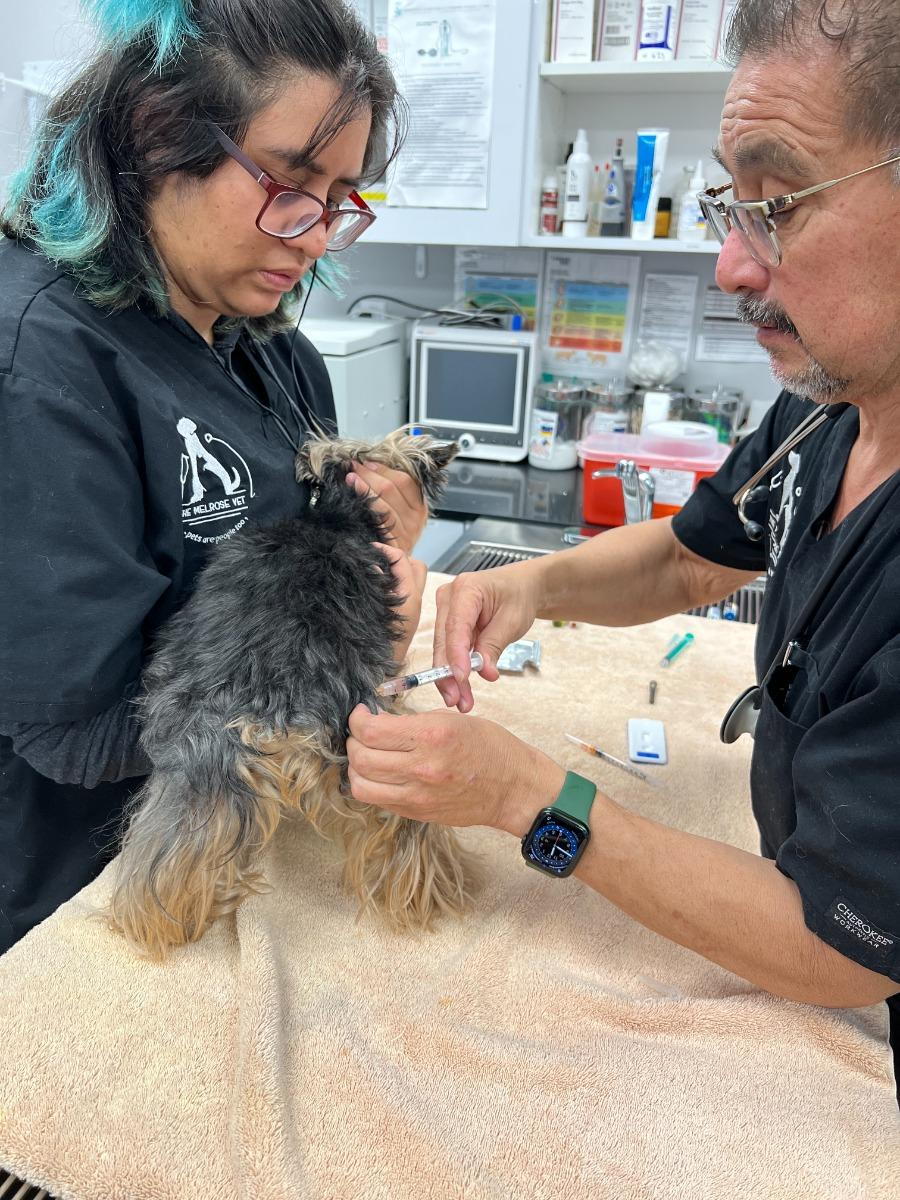Vaccinations For Dogs: What You Need To Know

- posted: Feb. 04, 2023
Vaccinating your dog is one of the most important things you can do to ensure their long-term health and well-being. Vaccines help protect your pet from potentially deadly diseases and are easy to acquire and administer. But what vaccinations should you be giving your dog? Let’s take a look at some of the most common dog vaccinations.
Core Vaccines for Dogs
The American Animal Hospital Association (AAHA) recommends the core vaccines for dogs and include distemper, parvovirus, adenovirus (hepatitis), and rabies. Distemper is a virus that affects both the upper respiratory and nervous systems in dogs; it can be fatal if left untreated.
Parvovirus is an infectious disease that causes severe vomiting and diarrhea in young puppies; the virus can also damage their heart muscles. Meanwhile, adenovirus affects the liver, lungs, eyes, and kidneys in both puppies and adult dogs; it can be spread through contact with infected saliva or urine. Finally, rabies is an infectious disease that affects mammals—including humans—and can be fatal if left untreated.
Non-Core Vaccines for Dogs
In addition to these core vaccines, several non-core vaccines available for dogs may be recommended depending on where you live or how often your dog interacts with other animals.
These vaccines include bordetella bronchiseptica (kennel cough), leptospirosis, Lyme disease, canine influenza virus H3N2/H3N8 strain, coronavirus, canine parainfluenza virus type 2b strain (CPIV2b), Giardia, rattlesnake venom vaccine(s), and more. Talk to your veterinarian about which of these non-core vaccines they recommend based on your dog’s lifestyle.
Conclusion
Keeping up with vaccinations is essential to keeping your pet healthy throughout its life. While there are many different types of vaccines available for pets—from core vaccines such as distemper, parvovirus, and rabies to non-core vaccines such as bordetella bronchiseptica.
it’s important that you talk to your veterinarian about which ones they recommend based on where you live or how often your pet interacts with other animals. With proper care and regular vaccinations, you can help ensure your furry friend stays safe and healthy throughout life!

- posted: Feb. 04, 2023
Vaccinating your dog is one of the most important things you can do to ensure their long-term health and well-being. Vaccines help protect your pet from potentially deadly diseases and are easy to acquire and administer. But what vaccinations should you be giving your dog? Let’s take a look at some of the most common dog vaccinations.
Core Vaccines for Dogs
The American Animal Hospital Association (AAHA) recommends the core vaccines for dogs and include distemper, parvovirus, adenovirus (hepatitis), and rabies. Distemper is a virus that affects both the upper respiratory and nervous systems in dogs; it can be fatal if left untreated.
Parvovirus is an infectious disease that causes severe vomiting and diarrhea in young puppies; the virus can also damage their heart muscles. Meanwhile, adenovirus affects the liver, lungs, eyes, and kidneys in both puppies and adult dogs; it can be spread through contact with infected saliva or urine. Finally, rabies is an infectious disease that affects mammals—including humans—and can be fatal if left untreated.
Non-Core Vaccines for Dogs
In addition to these core vaccines, several non-core vaccines available for dogs may be recommended depending on where you live or how often your dog interacts with other animals.
These vaccines include bordetella bronchiseptica (kennel cough), leptospirosis, Lyme disease, canine influenza virus H3N2/H3N8 strain, coronavirus, canine parainfluenza virus type 2b strain (CPIV2b), Giardia, rattlesnake venom vaccine(s), and more. Talk to your veterinarian about which of these non-core vaccines they recommend based on your dog’s lifestyle.
Conclusion
Keeping up with vaccinations is essential to keeping your pet healthy throughout its life. While there are many different types of vaccines available for pets—from core vaccines such as distemper, parvovirus, and rabies to non-core vaccines such as bordetella bronchiseptica.
it’s important that you talk to your veterinarian about which ones they recommend based on where you live or how often your pet interacts with other animals. With proper care and regular vaccinations, you can help ensure your furry friend stays safe and healthy throughout life!
The Melrose Vet
8304 Melrose Ave,
Los Angeles, CA 90069
